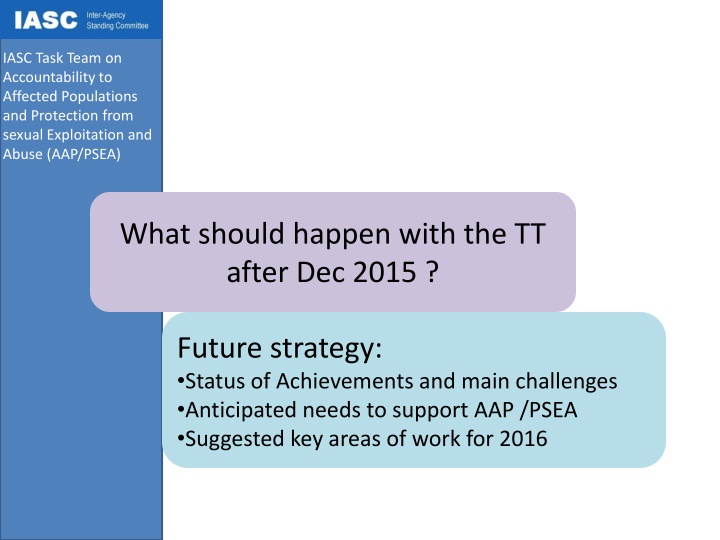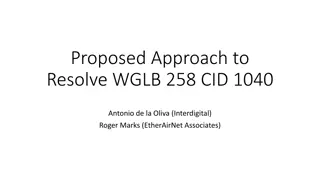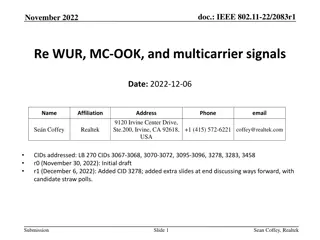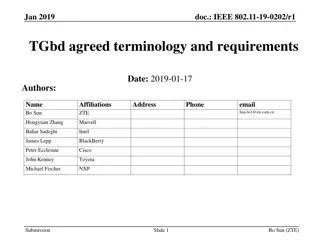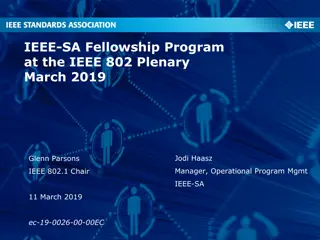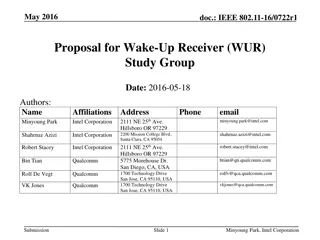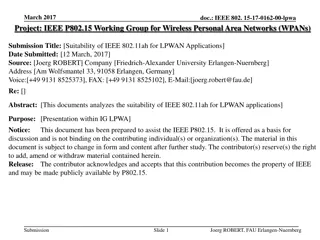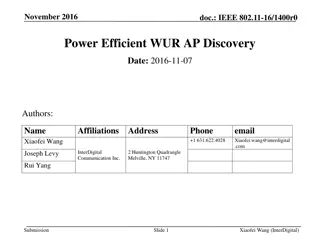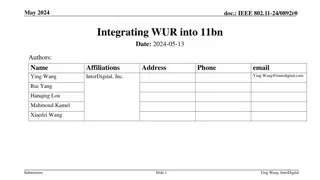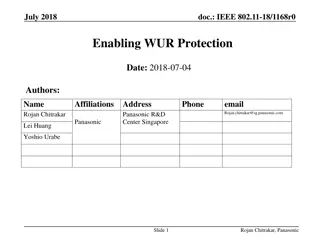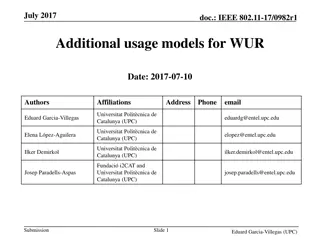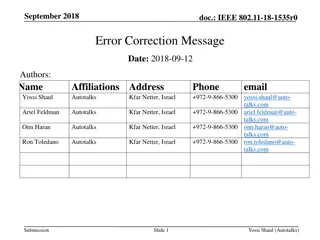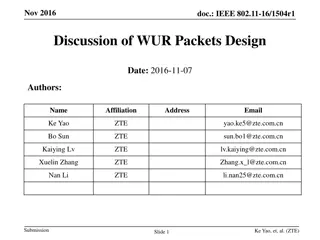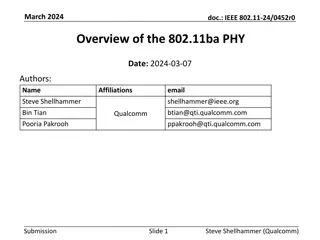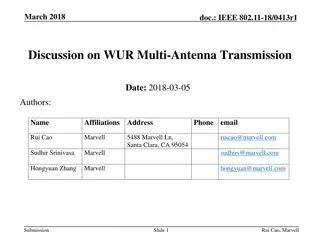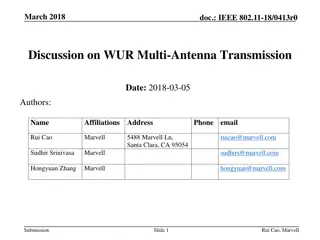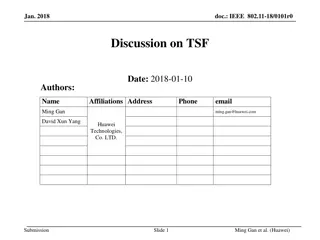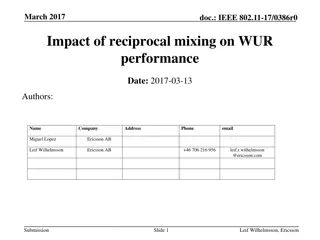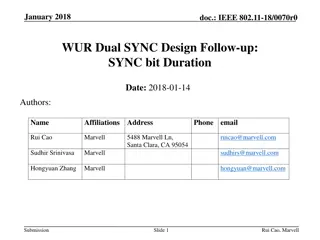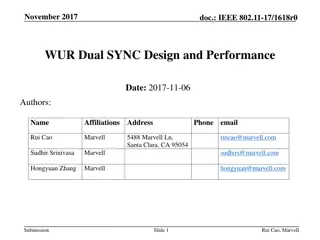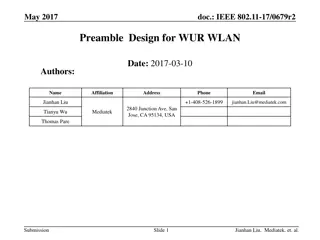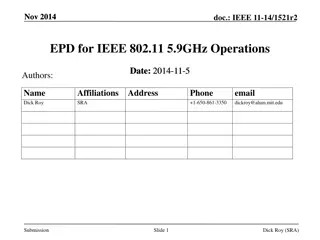Discussion of WUR Packets Design for IEEE 802.11-16
WUR technology is a high-efficiency power-saving method for WLAN devices. This document delves into the principles and functionality of WUR packet design, focusing on efficient power consumption and transmission, wake-up requirements, and packet contents. It discusses the key elements needed in wake-up packets to support various operations and maintain WUR link connections.
Download Presentation

Please find below an Image/Link to download the presentation.
The content on the website is provided AS IS for your information and personal use only. It may not be sold, licensed, or shared on other websites without obtaining consent from the author.If you encounter any issues during the download, it is possible that the publisher has removed the file from their server.
You are allowed to download the files provided on this website for personal or commercial use, subject to the condition that they are used lawfully. All files are the property of their respective owners.
The content on the website is provided AS IS for your information and personal use only. It may not be sold, licensed, or shared on other websites without obtaining consent from the author.
E N D
Presentation Transcript
IASC Task Team on Accountability to Affected Populations and Protection from sexual Exploitation and Abuse (AAP/PSEA) What should happen with the TT after Dec 2015 ? Future strategy: Status of Achievements and main challenges Anticipated needs to support AAP /PSEA Suggested key areas of work for 2016
Overview of the IASC AAP PSEA TT Objective of the Task Team (in the current TORs) Create a system-wide culture of accountability : institutionalization of AAP, including PSEA, in function and resourcing within each humanitarian organization alongside system level cohesion, coordination, and learning. As reported to the IASC principals, The Task Team undertook following main tasks : work with, and support, Humanitarian Country Teams operationalise accountability & PSEA at the collective level engage with donors in advancing the accountability agenda, including the strengthening of requirements for funding recipients to demonstrate progress on accountability and PSEA; develop a broader advocacy strategy to ensure that all humanitarian actors are aware of their roles and responsibilities with regard to AAP & PSEA, and disseminate good practices on AAP & PSEA What have we been working on ?
Key Achievements of the Task Team Advocacy with partners and donors to highlight the essential linkages between AAP and PSEA, and increased collaboration at policy and field level. Support provided to the World Humanitarian Summit (WHS) Secretariat regarding AAP/PSEA and engagement of communities in the WHS consultations. Work Stream 1 AAP/PSEA Advocacy Field missions to support operationalisation of AAP /PSEA STAIT webinars on AAP Increased collaboration between AAP/PSEA Task Team and Protection Mainstreaming Task Team, to capitalise on linkages between protection and AAP and specific work on the recommendations of the Whole of System reprot on Protection Helpdesk set up to share good practices and respond to technical queries from partners. AAP included in Disaster Risk Reduction strategies in multi-agency projects including local governments Increased links with some clusters to support them in operationalising AAP, and workshop planned with Global Cluster Coordinators Inclusion of AAP and PSEA into Humanitarian Coordinators (HC) compact, HC annual workshop, Humanitarian Country teams (HCT) self assessment indicators, and planned support to some HCTs (Niger and Iraq, dates to be confirmed) . Advocacy work through webinar and initial development of a PSEA campaign Support to CBCM pilot projects in Dolo Addo and DRCongo and link with the global SOPs Support to UN agencies, NGOs and HCT s technical requests on PSEA through the helpdesk Work Stream 2 Operationalizing AAP/PSEA in country-level activities and provision of technical support Work Stream 3 PSEA activities
Challenges to complete task team workplan While the TT has over hundred members on the mailing list, a few are active members. In link with the subsidiarity approach of our work, the TT need to secure the active participation at the global level of local and national members Membership active in achieving Task Team goals continue to do so based on individuals interest more than on organisational commitment : When staff actively participating in the TT change jobs, it takes months until another staff member is identified by the organisation to join the TT. Disruption is significant when the organisation was the lead on one TT objective. Active participation in the task team and leadership on one objective requires time, which needs to be factored into staff workplans by organisations. Need to clarify how initiatives on community engagement or CWC can be better coordinated with the task team, to avoid confusion and fragmentation. While it is encouraging to see an increasing commitment to meaningfully and continuously engage with communities throughout the project cycle, we should endeavour to avoid fragmentation of the humanitarian response and work together The merger of the AAP and PSEA Taskforces into one task team proved difficult initially, but collaboration both at policy level and in the field support this joint approach Participation Fragmentation Need to clarify between collective and individual achievements Task team objectives should not be the sum of individual agencies achievements on each of the areas of work, but rather collective work under the leadership of one member. It means additional work on top of each agency s workplan, and this needs to be factored into work plans.
Question to Task team members : Do you see any other challenges the Task team is facing to complete its workplan ?
Why the Task Team needs to continue after Dec 2015 While many task team objectives will have been reached in Dec 2015, some will still be pending due to major gaps in staffing during the year. New staff on board particularly for Objective 2.5 (Civil society, National NGOs and Implementing Partners involvement in AAP/ PSEA) and Objective 3.3 (PSEA included in organisation recruitment processes, policies and performance appraisals) will need additional months to catch up and implement the planned actions. Many objectives such as the one related to advocacy (block 1) or to operationalisation ( block 2) need continuous attention and the scope of support should be expanded Delivering on our workplan AAP and PSEA is repeatedly emerging in the Operational Peer Reviews as one of the main course correction needed. HCTs recognize that AAP and PSEA are important, but need support on operationalising them at collective level. Operational Peer Reviews (OPR) Community Based Complaints Mecanisms (CBCM) The drafting of global Standard Operating Proecedures under the leadership of IOM DG Swing for community-based complaints mechanism has been initiated following requests from the field and implementation will need support
Global processes requiring Task Team support in 2016 Accountability has emerged as a priority in the WHS regional consultations, which will lead to AAP and PSEA specific recommendations in the final synthesis report. The task team could promote, support and follow-up recommendations that emerge. The Task Team contributed to the WHS Community Engagement strategy and should support it in the implementation phase to ensure fragmentation is avoided and essential linkages with accountability kept. WHS The Whole of System report on protection in humanitarian settings has a set of recommendations dedicated to AAP and PSEA . Taking into account work already being done in the workplan, the Task Team has worked closely with the Global Protection Cluster and the Protection Mainstreaming Task Team to analyse and propose follow through on the recommendations. Whole of System review on Protection Accountability is one of the 3 pillars of the Transformative Agenda, and the task team is supporting the STAIT team in this regard with for instance planning of additional webinars on AAP and specific ones on PSEA. Transformative Agenda
Questions to Task Team members : Do you see other reasons for the task team to continue after 2015 ? Which key areas of work would you envisage for 2016? Do you think the structure of the Task Team needs review for 2016?
